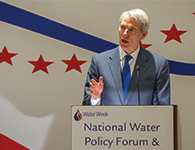Water Week 2016 Draws Hundreds to Washington
 This past week NACWA members and other clean water professionals from across the country gathered in Washington to advocate for the clean water sector during the 2016 National Policy Forum, Fly-In, and Expo – the anchor event of Water Week 2016. Over 200 participants engaged in the Policy Forum, and in total more than 60 national, state, and regional organizations collaborated in and/or sponsored the Water Week 2016 activities! In their home communities, many NACWA member agencies also engaged in #WaterWeek16 through events and outreach.
This past week NACWA members and other clean water professionals from across the country gathered in Washington to advocate for the clean water sector during the 2016 National Policy Forum, Fly-In, and Expo – the anchor event of Water Week 2016. Over 200 participants engaged in the Policy Forum, and in total more than 60 national, state, and regional organizations collaborated in and/or sponsored the Water Week 2016 activities! In their home communities, many NACWA member agencies also engaged in #WaterWeek16 through events and outreach.
At a time of joint water crises in Flint, Michigan and growing drought concerns in the West, the Policy Forum and Water Week provided an opportune time to engage federal policymakers on key clean water challenges facing utilities all over the nation. The Policy Forum was presented by NACWA, the Water Environment Federation (WEF), the Water Environment Research Foundation (WERF), the WateReuse Association, and the Water Research Foundation (WRF). This collaboration generated a compelling, unified message to Congress and regulators from the clean water sector. It also helped develop a robust agenda of engaging speakers and roundtables for attendees.
The Policy Forum kicked off with remarks from top political journalist Amy Walter, who offered insights into the national political situation during this unprecedented campaign cycle. Deputy Assistant Administrator Joel Beauvais of the US Environmental Protection Agency (EPA) Office of Water then spoke about key EPA water priorities (see related article). Remarks were also provided by John Sullivan, Chief Engineer of the Boston Water & Sewer Commission, who has played an important role in helping EPA assess the situation in Flint, Michigan. As many NACWA members are experiencing, the Flint crisis has gone far beyond the drinking water sector to spur new attention and scrutiny to clean water infrastructure, water quality, and water professionals themselves. To help kick off Hill visits and discuss the importance of engaging with Members of Congress, the conference also featured former U.S. Representative Jim Moran, formerly the Democratic leader of the House Interior & Environment Appropriations Subcommittee.
U.S. Senator Rob Portman (R-OH), U.S. Rep. Ken Calvert (R-CA), and U.S. Rep. Dan Kildee (D-MI) each addressed the Policy Forum to share their legislative ideas and the water priorities in their respective regions of the country. Three Members of Congress – Sen. Portman, Rep. Calvert, and Sen. Baldwin (D-WI) – were also awarded NACWA’s 2016 National Environmental Achievement Award for their efforts to advance sound legislation for the clean water sector and support federal funding for water infrastructure. And to hear from the individuals working on water legislation day-in and day-out, two Congressional Staff Panels were convened, including both Republican and Democratic staff of the House Water Resources and Environment Subcommittee, House Appropriations Interior & Environment Subcommittee, and key Member offices.
Hill Visits Stress Importance of Water Sector Funding
Many of the Members of Congress and Hill staff who addressed the Policy Forum mentioned the value that a united water sector brings, with each organization leveraging their respective expertise to advance shared priorities. Speakers also mentioned the “zero-sum” realities of federal funding – when it comes time for Appropriators to allocate federal dollars between various worthy causes, the ‘squeakiest wheel’ may indeed come out ahead.
To help communicate shared clean water sector needs, Policy Forum attendees were able to leverage a compelling one-pager  developed by NACWA, WEF, WERF, and WateReuse while also sharing their individual stories and concerns with their respective Congressional offices. While the visits are still being tallied, it appears that the 2016 Fly-In may have resulted in a record number of Hill office visits from clean water professionals. NACWA and our partners greatly appreciate the efforts of all who attended – and encourages those who were unable to attend to request a meeting with their Members of Congress or offer a tour of their facilities back home.
developed by NACWA, WEF, WERF, and WateReuse while also sharing their individual stories and concerns with their respective Congressional offices. While the visits are still being tallied, it appears that the 2016 Fly-In may have resulted in a record number of Hill office visits from clean water professionals. NACWA and our partners greatly appreciate the efforts of all who attended – and encourages those who were unable to attend to request a meeting with their Members of Congress or offer a tour of their facilities back home.
To celebrate Water Week, facilitate additional networking, and provide an opportunity to hear from more Members of Congress, a Congressional Reception was held Tuesday evening. Lovely weather and a great view of the U.S. Capitol set the stage for remarks by U.S. Reps. Bob Gibbs (R-OH), Paul Tonko (D-NY), Earl Blumenauer (D-OR), Jared Huffman (D-CA), and Jerry McNerney (D-CA).
Key legislation of interest to the water sector introduced this Congress has been summarized by NACWA for the House and Senate
and Senate – please review when you have an opportunity and contact
Pat SinicropiThis e-mail address is being protected from spambots. You need JavaScript enabled to view it
or
Kristina SurfusThis e-mail address is being protected from spambots. You need JavaScript enabled to view it
at with any questions regarding individual bills.
– please review when you have an opportunity and contact
Pat SinicropiThis e-mail address is being protected from spambots. You need JavaScript enabled to view it
or
Kristina SurfusThis e-mail address is being protected from spambots. You need JavaScript enabled to view it
at with any questions regarding individual bills.
EPA Brings Message of Leadership, Collaboration and Innovation to Policy Forum
 Senior officials from EPA’s Office of Water provided their perspective on a range of priority issues during the National Water Policy Forum & Fly-In, including ongoing work in Flint, Michigan to restore a safe drinking water supply system and rebuild the community’s confidence in the regulatory oversight process. Joel Beauvais, Deputy Assistant Administrator for the Office of Water, addressed Forum attendees and encouraged utilities to view themselves as “agents of change”. Providing leadership on areas such as climate change, nutrients and the Utility of the Future will lead to the “best helping the rest” Beauvais said, where top-performing utilities can lead by example and help to bring broader change to the water sector.
Senior officials from EPA’s Office of Water provided their perspective on a range of priority issues during the National Water Policy Forum & Fly-In, including ongoing work in Flint, Michigan to restore a safe drinking water supply system and rebuild the community’s confidence in the regulatory oversight process. Joel Beauvais, Deputy Assistant Administrator for the Office of Water, addressed Forum attendees and encouraged utilities to view themselves as “agents of change”. Providing leadership on areas such as climate change, nutrients and the Utility of the Future will lead to the “best helping the rest” Beauvais said, where top-performing utilities can lead by example and help to bring broader change to the water sector.
A panel discussion with the directors for the Office of Water’s four main divisions and a series of roundtable discussions closed out the Policy Forum. Beauvais has encouraged the water office directors to look across the office and beyond their programmatic silos to explore new ways of achieving clean and safe water. When questioned about how to best make progress in the future, the water office directors stressed the importance of integrated water management but also recognized that obstacles remain, including ensuring that concepts discussed at the headquarters level are not lost as they are pushed out to the regions.
The final morning of the Policy Forum also featured a short session on an important collaboration among EPA and the major water sector organizations. Since 2007 the water sector and EPA have embraced the Effective Utility Management concept and the ten attributes and five keys to management success first laid out by a group of utility leaders nearly a decade ago. In 2015 the collaboration embarked on an effort to revise and update the attributes and keys to better reflect today’s water utility. The report from that effort was released earlier this year and the session marked a renewed commitment from the collaborating organizations to keep working together on the EUM initiative.
from that effort was released earlier this year and the session marked a renewed commitment from the collaborating organizations to keep working together on the EUM initiative.
NACWA Board Positions Association for FY 2017 & Beyond
 The Association’s Board of Directors met on April 11 for their spring meeting, taking action on a number of items to position NACWA for the future. Included in their actions was the approval of a FY 2017 – 2021 Financial Plan, preliminary FY 2017 General Fund and Targeted Action Funds (TAF) budgets and a Compensation Philosophy for the National Office. The adopted FY 2017 – 2021 Financial Plan charts a path for growth for the Association that will allow NACWA to aggressively pursue its strategic advocacy, membership engagement, and communications objectives. The preliminary FY 2017 General Fund and TAF budgets, developed with the Financial Plan as a backdrop, included a thorough review of revenues and expenditures, as well as an assessment of NACWA’s ability to maintain and enhance its delivery of essential services to its members. Both Board-approved preliminary budgets will be forwarded to the membership for review and comment prior to their final consideration by in July.
The Association’s Board of Directors met on April 11 for their spring meeting, taking action on a number of items to position NACWA for the future. Included in their actions was the approval of a FY 2017 – 2021 Financial Plan, preliminary FY 2017 General Fund and Targeted Action Funds (TAF) budgets and a Compensation Philosophy for the National Office. The adopted FY 2017 – 2021 Financial Plan charts a path for growth for the Association that will allow NACWA to aggressively pursue its strategic advocacy, membership engagement, and communications objectives. The preliminary FY 2017 General Fund and TAF budgets, developed with the Financial Plan as a backdrop, included a thorough review of revenues and expenditures, as well as an assessment of NACWA’s ability to maintain and enhance its delivery of essential services to its members. Both Board-approved preliminary budgets will be forwarded to the membership for review and comment prior to their final consideration by in July.
NACWA’s Board also acted to appoint Chris Crockett, Deputy Commissioner, Planning & Environmental Services, of the Philadelphia Water Department (PWD) to a Region 3 seat on the Board. Crockett, who currently the Chair of NACWA’s Climate & Resiliency Committee, will fill the seat previously held by former PWD Commissioner Howard Neukrug. The Philadelphia Water Department is a founding member of NACWA and has a long tradition of commitment to – and leadership in – the Association. In acting on the appointment not only did the Board secure an exceptional Board Member, they also ensured regional balance on the Board.
In other actions, NACWA’s Board approved FY 2016 Targeted Action Funds for an update to the Association’s consent decree handbook, Wet Weather Consent Decrees: Protection POTWs in Negotiations, as well as engagement in an amicus curiae brief in Ohio Value Environmental Coalition v. FOLA Coal Company to help preserve the permit shield as a strong defense for NPDES permittees to unreasonable citizen suit enforcement.
The Board also engaged in a ‘mega issue discussion’, East Meets West . . . Connecting the Dots on Critical Water Priorities, which focused on enhancing a unity of interests between Western and Eastern water quality issues and a “all for one, one for all” approach to achieve the best overall outcome for clean water. NACWA’s Board of Directors will next meet in July during the Association’s Utility Leadership Conference & 46th Annual Meeting, Leadership Strategies for the Smart Utility.
Stormwater Thought Leaders Engage in National Policy Dialogue
 As part of Water Week 2016, NACWA, the Water Environment Federation (WEF), and the National Association of Flood & Stormwater Management Agencies (NAFSMA) convened 30 municipal stormwater thought leaders from around the nation for a dialogue on advancing new stormwater policy initiatives in the United States. The dialogue prioritized actionable policy issues and identified potential policy objectives that the associations, as part of a broader municipal stormwater advocacy community, could work to achieve. Participants in the discussion expressed hope that it would serve as the beginning of an ongoing, longer-reaching series of strategy sessions.
As part of Water Week 2016, NACWA, the Water Environment Federation (WEF), and the National Association of Flood & Stormwater Management Agencies (NAFSMA) convened 30 municipal stormwater thought leaders from around the nation for a dialogue on advancing new stormwater policy initiatives in the United States. The dialogue prioritized actionable policy issues and identified potential policy objectives that the associations, as part of a broader municipal stormwater advocacy community, could work to achieve. Participants in the discussion expressed hope that it would serve as the beginning of an ongoing, longer-reaching series of strategy sessions.
From Capitol Hill to the White House and EPA, federal policymakers are more and more interested in mitigating the effects of urban stormwater runoff. In light of this, the national municipal stormwater sector needs a broader policy discussion to articulate the sector’s most critical needs, identify where and how federal resources can be most helpful, and advance a unified, comprehensive advocacy agenda. This is critical not only during the last year of the Obama Administration, but also to best position municipal stormwater advocacy issues for a new Administration and a new Congress next year. NACWA looks forward to continued work with WEF and NAFSMA to advance this important discussion.
EPA Releases Utility Customer Assistance Programs Resource
 EPA released a compendium of Drinking Water & Wastewater Utility Customer Assistance Programs (CAPs) on April 14, providing a national overview of programs used by communities to provide assistance to low-income ratepayers who cannot afford to pay the full cost of their water and sewer bills. The compendium includes detailed descriptions and of the various types of CAPs – Bill Discount, Flexible terms, Lifeline Rate, Temporary Assistance, and Water Efficiency. NACWA’s Water Finance Workgroup helped develop and review the report and provided many of the case studies.
EPA released a compendium of Drinking Water & Wastewater Utility Customer Assistance Programs (CAPs) on April 14, providing a national overview of programs used by communities to provide assistance to low-income ratepayers who cannot afford to pay the full cost of their water and sewer bills. The compendium includes detailed descriptions and of the various types of CAPs – Bill Discount, Flexible terms, Lifeline Rate, Temporary Assistance, and Water Efficiency. NACWA’s Water Finance Workgroup helped develop and review the report and provided many of the case studies.
Clean water utilities nationwide are adopting innovative ways to ensure their services remain affordable to their customers. The Association and its members have long stressed that the affordability challenge is one of the largest facing the industry today, and commends EPA for putting together this compendium.
To complement this work, NACWA is collaborating with other water sector organizations to develop a state-by-state analysis of legal and regulatory barriers to establishing ratepayer assistance programs. This analysis will help inform the types of policy changes that may be needed – at both the national and state level – to encourage development of rate assistance programs for low-income populations. The analysis is scheduled to be complete in early 2017.
Member Spotlight: Voters Approve St. Louis MSD’s Stormwater Tax
 On April 5, the Metropolitan St. Louis Sewer District (MSD) received voter approval for a district-wide property tax to fund operations and maintenance of the stormwater sewer system throughout MSD’s service area (Proposition S
On April 5, the Metropolitan St. Louis Sewer District (MSD) received voter approval for a district-wide property tax to fund operations and maintenance of the stormwater sewer system throughout MSD’s service area (Proposition S  ). Voters also approved Proposition Y, which authorizes bond financing for the next four years of work required by the District’s $4.7 billion, 23-year agreement with EPA and the Missouri Coalition for the Environment.
). Voters also approved Proposition Y, which authorizes bond financing for the next four years of work required by the District’s $4.7 billion, 23-year agreement with EPA and the Missouri Coalition for the Environment.
MSD’s stormwater services have been funded through a variety of property taxes and a flat fee on each month's MSD bill. The amount of property taxes paid by an individual customer—and thus, the stormwater service received—is very much a function of where a customer lives. This system has resulted in a patchwork of inconsistent levels of service throughout the system, with large swaths of MSD’s service area receiving the lowest level of stormwater service possible. The new approach approved by voters will allow for a new stormwater maintenance tax that will be far more equitable and provide consistent levels of service system wide.
The stormwater tax proposition is the result of a November 2013 Missouri Supreme Court decision invalidating MSD’s previous stormwater user charge as an invalid tax because it had not been put to a voter referendum as required by Missouri law. NACWA and a number of other municipal groups filed an amicus brief
 supporting MSD’s efforts. The Association applauds MSD’s ingenuity in finding a path forward to fund necessary stormwater service despite the negative judicial decision.
supporting MSD’s efforts. The Association applauds MSD’s ingenuity in finding a path forward to fund necessary stormwater service despite the negative judicial decision.
The Missouri Supreme Court decision is one of many cases that are analyzed in NACWA’s white paper on stormwater litigation: Navigating Litigation Floodwaters: Legal Considerations for Funding Municipal Stormwater Programs. In coming weeks, NACWA will release the 2016 edition of the paper. This resource provides analysis on the types of legal issues impacting stormwater funding programs and helps equip members with critical knowledge and tools to prepare utilities that are creating, implementing or defending a stormwater program, utility or fee. The white paper is free for NACWA members.
- The deadline for applications for NACWA's Excellence in Management (EIM) Recognition Program has been extended until April 27, 2017. The EIM program honors utilities that have implemented management practices identified by the Ten Attributes of Effectively Managed Water Sector Utilities and Resource Efficiency & Protection Activities. Apply today.
- Registration is now open for NACWA's Pretreatment & Pollution Prevention Workshop , May 17-20 in Long Beach, CA. Optional training courses will be held on May 17, with the Workshop program scheduled for May 18-20.
- NACWA will be hosting a Region 4 Clean Water Utility Leader Dialogue on June 8, 2016 from 10:30 am – 3:00 pm in Atlanta, GA. Utilities and clean water professionals in Region 4 should register now to attend!
- NACWA has worked with the Department of Energy's (DOE) Southwest Combined Heat and Power Technical Assistance Partnership (CHP TAP) to organize a webinar on the applications of CHP at wastewater treatment plants and the resources that the CHP TAPs provide. The regional DOE CHP TAPs provide assistance to promote and advance the use of CHP systems throughout the nation and provide technical assistance including complimentary screenings and advice for entities considering CHP projects. The webinar will be held on Thursday, April 21 at 2:00 pm Eastern. Register today.
- The USDA Regional Conservation Partnership Program (RCPP) Team will be hosting a webinar on the changes to the FY 2017 RCCP Announcement for Program Funding on April 27 at 2:00 pm Eastern. This will be an opportunity to ask questions about the pre-proposal application process. Multiple NACWA members have been selected for previous rounds of RCPP awards, with the New York City Department of Environmental Protection and the Milwaukee Metropolitan Sewerage District having most recently received RCPP grants during the second round. This webinar will be recorded and on posted on the RCPP website.
- Survey on water reuse deadline extended! The Economic Pathways and Partners for Water Reuse Survey has been extended to April 26. The NACWA Water Reuse Workgroup assisted WERF's contractor in developing this survey to get a clearer national and regional picture of what makes reuse projects go from ideas to reality. The survey targets not only utilities that have built or are building reuse projects, but also those that have not. You can read more about the survey here.
- The Wet Weather Partnership will host its annual Conference, Cutting Edge Developments and Strategies for Urban Wet Weather Management Programs, in Louisville, KY, May 17-19. Registration is now open!
- The National Association of Flood & Stormwater Management Agencies (NAFSMA) has opened its 2016 Green Infrastructure Awards Program
 to recognize communities using GI to advance their wet weather management goals and enhance their communities. Applications are due on May 17. Applications are also available for a separate recognition program for communication
to recognize communities using GI to advance their wet weather management goals and enhance their communities. Applications are due on May 17. Applications are also available for a separate recognition program for communication  around "Improving Water Quality".
around "Improving Water Quality".
- Register today for the U.S. Water Alliance's One Water Leadership Summit, June 8-10, 2016, in Atlanta, GA. The Summit is the premier gathering of the country's sharpest minds addressing our nation's most urgent water challenges to build stronger and more prosperous communities.

Do you have perspectives to share – or want to learn more – about utility laboratory productivity and benchmarks? If you manage or work in a utility water quality lab and track productivity – either for individual methods or for generalized lab sections (e.g. bench chemistry, microbiology, or metals) – your experience and expertise could be invaluable to other clean water agencies. Join the robust conversation today on NACWA’s online community Engage™. Engage™ is the perfect place to ask explore operational and advocacy priorities and pose questions of clean water colleagues. Visit or join the community today!